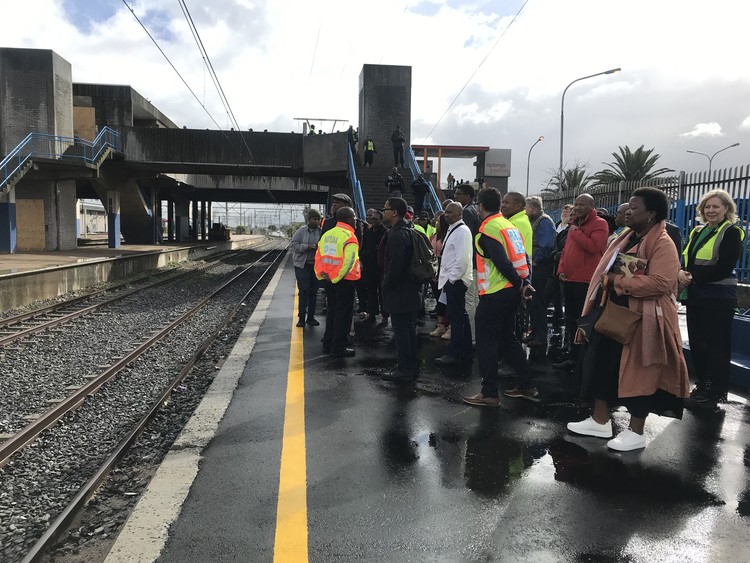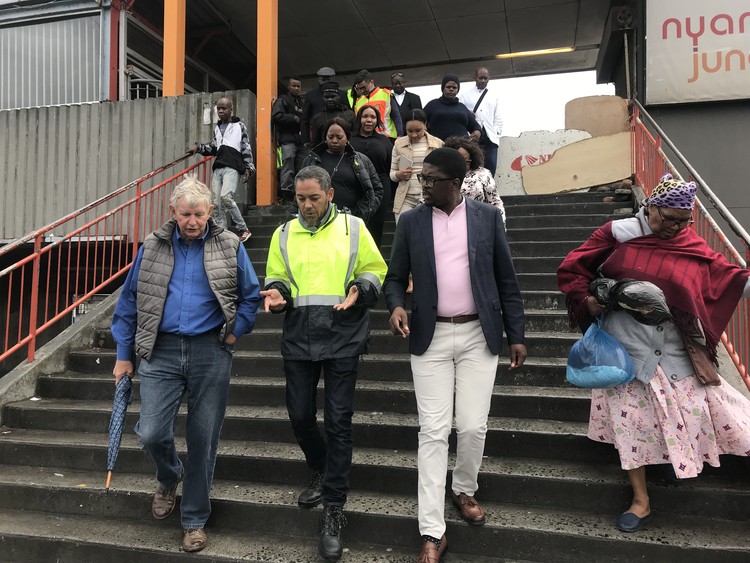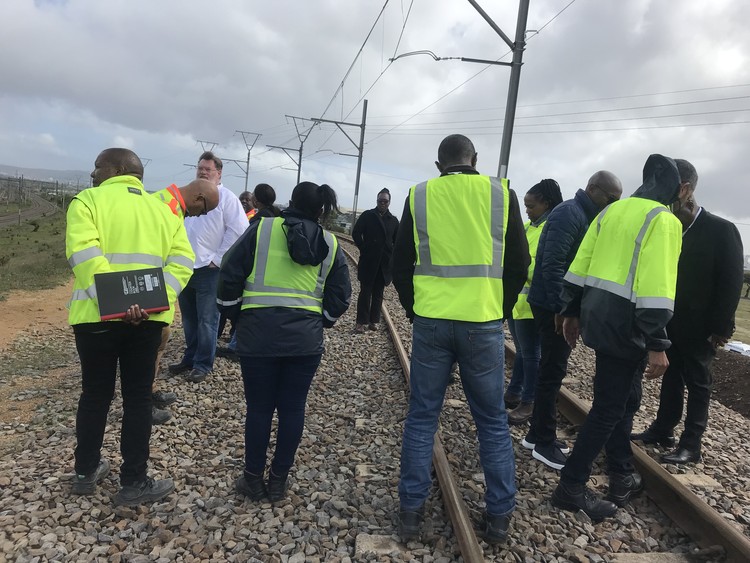PRASA’s decision to cancel railway security contracts “reckless and irresponsible” says SCOPA chair
Rail agency assures MPs that the Central Line in Cape Town would be fully operational by December
MPs from Parliament’s Standing Committee on Public Accounts (SCOPA) conducted an oversight visit at Nyanga train station with PRASA management on Thursday. Photos: Tariro Washinyira
- PRASA has promised that the Central Line between Nyanga and Chris Hani, Khayelitsha in Cape Town will be fully operational by December this year.
- The rail agency was briefing MPs on Parliament’s Standing Committee on Public Accounts (SCOPA) at Nyanga train station on Thursday.
- While SCOPA members were happy with progress so far, the committee chair said that the “decision to cancel the security contract was reckless, irresponsible.” He said they would be back in January 2024 to check if PRASA fulfils its duties.
- PRASA’s Group CEO noted that a major cause of delay could be the relocation of thousands of shack dwellers still living on the tracks along the line.
Metrorail’s Central Line service between Nyanga and Chris Hani, Khayelitsha in Cape Town will be fully operational by December this year, according to the Passenger Rail Agency of South Africa (PRASA) during a briefing with Parliament’s Standing Committee on Public Accounts (SCOPA) on Thursday.
On 16 March, GroundUp reported that PRASA had partially resumed services on the Central Line, which had been closed since 2019. Trains are running only from Nyanga to Maitland, stopping at all stations except Netreg which is still being rebuilt.
On Thursday, committee members conducted an oversight visit to inspect train infrastructure along the line, from Nyanga train station to the Netreg and Bonteheuwel stations. PRASA staff told MPs that the route had been severely damaged and vandalised.
SCOPA chairperson Mkhuleko Hlengwa said they want to assess whether progress has been made since the committee’s visit to the Western Cape’s railways in March 2022.
“A few years back the [previous] Board of PRASA took an erroneous decision to cancel a security contract, therefore leaving the entire PRASA railway infrastructure vulnerable and susceptible to criminality.
“The pandemic escalated the problem because there was vandalism of the structure throughout the country. We were here in March 2022 with the view to check on the extent of the problem in order to hold PRASA accountable,” he said.
Hlengwa said they believe “that at the heart of a functional economy is a functional railway” and that many people had been dependent on trains for travelling.
“There will of course need to be bailouts and subsidies. We need to ensure that whatever assistance is given, is consistent with good governance and other related legislation. We have seen that a lot of work has been done and we will continue to assess. At this point we are satisfied with what we have seen,” said Hlengwa.
He added that they were still waiting on PRASA to present SCOPA with a detailed security plan. “Ultimately what collapsed the infrastructure and made it vulnerable was the absence of security, not just here in the Cape, but throughout the country. We have visited Gauteng as well as part of the oversight.
SCOPA MP Robert Lees, PRASA CEO Hishaam Emeran (centre) and SCOPA chairperson Mkhuleko Hlengwa (right) walk with the delegation through the train station in Nyanga on Thursday.
“Our assessment is that the decision to cancel the security contract was reckless, irresponsible, and inconsistent with the financial management. But that sadly is a reality that needs to be corrected. What we need to assess now is whether that correction is done with necessary speed, urgency and within the budget. The committee will return in January 2024,” he said.
Hishaam Emeran, newly appointed PRASA Group CEO said, “We have appointed contractors and are ready to move but the relocation process [of shack dwellers] needs to be sorted out with the assistance of the departments of Human Settlements, Public Works, the Housing Development Agency and the City of Cape Town. There needs to be a long term solution.”
According to Emeran, people living in nearly 5,000 informal shacks are yet to be relocated. “As an interim solution, we have started Operation Bekela (which means open up) shifting close to 900 shacks. The contractors are putting in temporary fencing,” he said.
Regional engineering manager Raymond Maseko assured committee members that PRASA was working on the last portions of the Central Line. “From [Nyanga] the next station is Philippi, that is where the work is now going towards. At Philippi the line splits towards Mitchells Plain, then splits towards Chris Hani. This leaves three stations to reach Kapteinsklip, and seven stations to Chris Hani which is at the end. The completion date is December.
“We have contractors that are going to build foundations, walls and work on the network. We are not stopping at Netreg as everything was destroyed including the stairs to the station,” he explained.
Responding to questions about current security concerns, Maseko said, “We have six Nyalas. We can’t use bakkies because the railway line has no proper roads. There is an operational plan to protect a station. In the past we used to put guards at the station only, but the current plan is to have a vehicle patrolling at the outer perimeter and another vehicle patrolling inside the perimeter. We then have guards posted too.”
Alexio Papadopulo, acting chief security officer, said that at the end of 2022, they deployed an intervention security unit on the Central Line. “It is an integrated security plan which includes members of the community, law enforcement, crime intelligence as well as the SAPS in order to manage all security threats within the Central Line corridor. We have managed to eliminate theft and vandalism.”
Officials walk along the tracks between station on the central line to assess infrastructure damage.
Papadopulo said they currently had 2,000 personnel posted at specific points with limited resources. “Previously we didn’t have the arresting powers like a police officer, however from last year PRASA trained and developed its own officers so we can carry out the arrest.”
Except for a brief period, parts of the Central Line have been suspended since 2018 and were completely closed in October 2019. This line was the busiest line in Cape Town, serving the poorest communities which included Khayelitsha and Mitchells Plain.
After the closure, families erected their homes on the tracks as informal settlements expanded along the railway lines in Langa, Philippi and Khayelitsha. Then, during lockdown in 2020 and 2021, nearly all the infrastructure on the corridor was stolen or badly vandalised. Nothing much was left of Netreg train station which was stripped of its roof, windows and doors.
Then Transport Minister Fikile Mbalula promised that the Central Line would be fully operational by the end of 2022, but commuters were rightfully sceptical as this never happened. PRASA also missed previous deadlines. In July 2022, a partial service on the line restarted on the Pinelands to Bellville line via Langa, Bonteheuwel and Belhar.
Support independent journalism
Donate using Payfast

Don't miss out on the latest news
We respect your privacy, and promise we won't spam you.
Next: Refugees evicted from UNHCR offices in Pretoria
Previous: Changes to the party funding law: What does this mean and how does it affect you?
© 2023 GroundUp. This article is licensed under a Creative Commons Attribution-NoDerivatives 4.0 International License.
You may republish this article, so long as you credit the authors and GroundUp, and do not change the text. Please include a link back to the original article.
We put an invisible pixel in the article so that we can count traffic to republishers. All analytics tools are solely on our servers. We do not give our logs to any third party. Logs are deleted after two weeks. We do not use any IP address identifying information except to count regional traffic. We are solely interested in counting hits, not tracking users. If you republish, please do not delete the invisible pixel.



